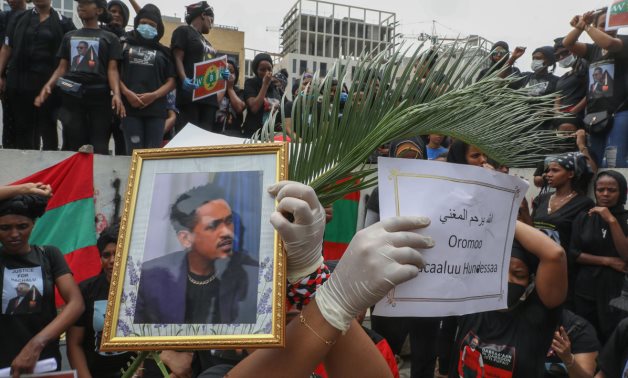
Members of the Oromo Ethiopian community in Lebanon take part in a demonstration to protest the death of musician and activist Hachalu Hundessa, in the capital Beirut on July 5, 2020. (ANWAR AMRO / AFP)
CAIRO – 10 July 2020: Protests and ethnic violence that erupted in Ethiopia last week following the murder of a popular singer from the Oromo ethnic group have claimed the lives of 239 people.
"Due to the unrest that occurred in the region, nine police officers, five militia members and 215 civilians have lost their lives," acting Oromia police commissioner Mustafa Kedir said on state television on Wednesday.
Hachalu Hundessa, an Ethiopian singer well known for his political songs, was shot dead Monday, 29 June 2020, only to be followed by seven others who were protesting his death a day later.
Hundessa, 34, who dedicated his voice to defend the rights of Ethiopia’s Oromo ethnic group, was killed while he was driving.
Protests broke out in the capital Addis Ababa, as well as the surrounding Oromia region which is the homeland of the country's largest ethnic group.
"To control this unrest more than 3,500 suspects have been arrested. They were anti-peace elements who carried out attacks using the artist's death as a pretext to dismantle the constitutional system by force," Kedir said.
"The Oromo population should be inclusive of other ethnic groups that live among it,” he added.
Officials have attributed the deaths to a combination of lethal force by security officers and inter-ethnic violence.
Police in Addis Ababa had previously reported 10 deaths in the capital.
"There are a lot of casualties, most of them are bullet injuries. Three patients died and there are still critical patients," Dr. Desalegn Fekadu, a surgeon at the Adama Hospital told AFP.
"There are also more than 10 patients with burn injuries. They said their houses were set on fire."
Meanwhile, in the eastern town of Chiro, two people were shot dead during protests, a medic at the local hospital told the BBC.
Hundessa was more than a singer especially to the Oromo people who spoke up about the political and economic marginalization that they had suffered under consecutive Ethiopian regimes.

Comments
Leave a Comment